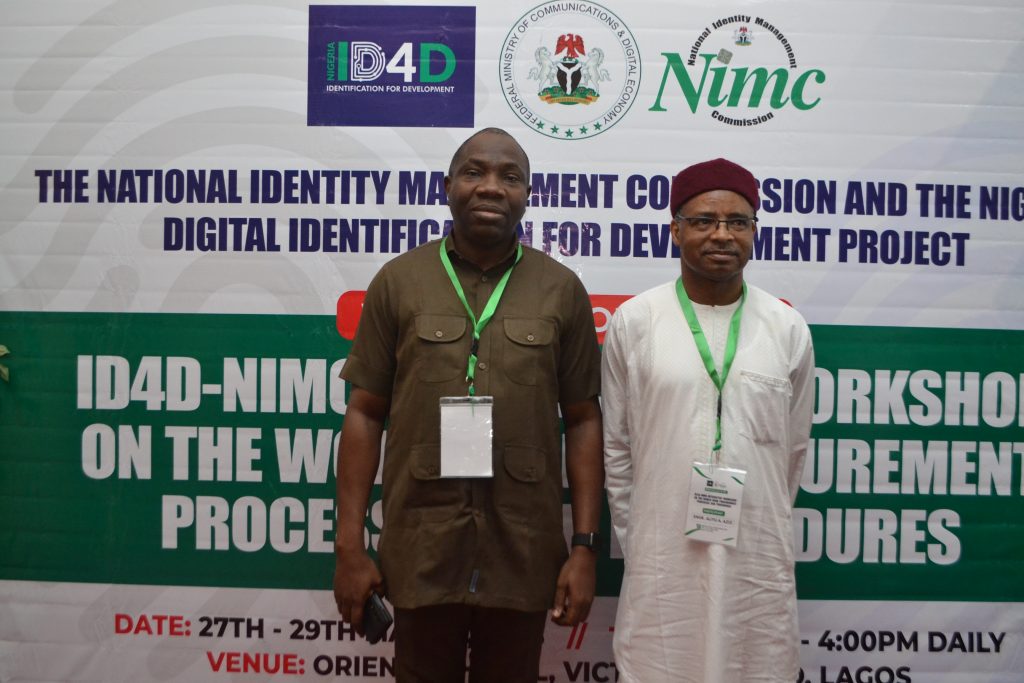
The Albino Foundation Public Notice
…As Expert Calls for Amendment
Director General and Chief Executive Officer of the National Identity Management Commission (NIMC), Engr. Aliyu Aziz Abubakar has charged members of the Management of the Commission to ensure strict compliance with the provisions of the country’s Public Procurement Act.
The NIMC helmsman gave the charge in Lagos on Monday, while delivering his remarks at a 3-day Interactive Workshop on Procurement and understanding of the World Bank procurement process, procedures, and Ecosystem Enrolment readiness, organized by the Nigeria Digital Identification for Development (ID4D) Project, in collaboration with NIMC.

According to a Press Release, jointly signed by the Nigeria Digital ID4D project Communications Manager, Dr. Walter Duru and NIMC’s Head of Corporate Communications, Kayode Adegoke, the NIMC CEO stressed that the event was put together to enhance the capacity of the Management team on the provisions and application of the country’s Public Procurement Act.
He spoke on the need for similar training to be held more frequently to ensure improved capacity of team members on contemporary issues in public procurement.
In his statement of the workshop objectives, Project Coordinator, Nigeria Digital Identification Project, Musa Odole Solomon described the meeting as geared towards updating participants on contemporary issues in procurement, adding that “there was the need for understanding the meeting point between the country’s procurement laws and the World Bank’s procurement regulations.”
Also speaking, Director, Legal and Regulatory Affairs at NIMC, Hadiza Dagabana called for the amendment of Nigeria’s Public Procurement Act.
According to her, “the Public Procurement Act was passed in 2007. We are in 2023. A lot of things have changed over the years and there are so many gaps in the Act. It is time for an amendment.”
She described the workshop as impactful, urging the participants to put into practice the knowledge acquired.
In her “Overview of Public Procurement Act (2007) and its convergence with the World Bank Procurement Regulations for Borrowers,” Ag. Director of Procurement at the National Identity Management Commission, Princess Nkoyo Iwok, called on public institutions in Nigeria to embrace transparency and accountability in all their transactions, reiterating that sanctions apply for violation of the public procurement law.
Iwok identified some common offences in procurement as “bid rigging, collusion, splitting of contracts, procurement fraud, altering procurement documents, willful refusal to allow bureau and its officers access to any procurement records and using fake documents.”
She highlighted some of the sanctions for violation of the Public Procurement Act to include imprisonment, upon conviction, among others.
On the convergence between World Bank Procurement Guidelines for Borrowers & Nigeria Public Procurement Act 2007, Iwok stressed that “both the World Bank Procurement Guidelines and Nigeria’s Public Procurement Law emphasize the importance of procurement planning.”
On transparency and competition, she explained that “both the World Bank Procurement Guidelines and Nigeria’s Public Procurement Law promote transparency and competition in procurement processes.”
Continuing, she argued that “while there are some similarities between the two procurement frameworks, it is important to note that the World Bank Procurement Guidelines are generally more comprehensive and detailed than Nigeria’s Public Procurement Law. As such, borrowers in Nigeria that are subject to the World Bank Procurement Guidelines will need to ensure that their procurement practices are consistent with both frameworks,” she stressed.
In his presentation on Proposal and Bid Evaluation procedures/Project Risk Management and Control strategy, Procurement Officer, Project Implementation Unit of the Nigeria Digital ID4D, Ibrahim Abu, argued that “procurement is infused with numerous risks,” even as he made a case for proper risk management practices and tactics to reduce same.



